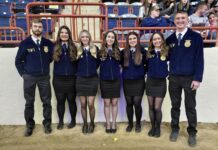It’s December once again. We have made it through another grazing season.
At this point you either have some forages stockpiled or not. You have put up all the hay that you could, or you are worried about running short.
This time of year is when farmers have a little extra time to assess what went right and what went wrong. This is when the blame gets spread around: “The weather didn’t cooperate,” “The equipment kept breaking down,” “The farmer got lazy,” “Disease and pestilence was all around” or “The family needed my help more than the hay” are just a few that I hear.
Looking ahead
This is also the time of year when I hear: “I’m gonna do better next year,” “I’m gonna get the equipment in shape this winter,” “The almanac says that we’re gonna have good weather for putting up hay next spring” or ”I’m gonna book my seed early and be ready when it’s planting time.”
Farmers always seem to be optimistic about the future. I guess that to be a farmer, you must be somewhat of an optimist, or you would have given up a long time ago. Either that, or you make too much money, and you need to find a good place to show a loss on your taxes.
Looking back
As a regular reader of the All About Grazing column, you have had the opportunity to read a variety of articles on many things the affect grazing. Looking back, there have been articles on growing better forages, weed control, insect pests and weeds that affect livestock health, making better hay and keeping it safe, dealing with fence problems and articles about grazing cattle, horses, sheep, goats and even pigs.
These were written by extension educators who deal with these issues on a regular basis around the state of Ohio and beyond. Winter would be a great time to look back at those articles and refresh your memory as you plan for the new year.
If you didn’t save past issues, you can ask your friends and neighbors, contact Farm and Dairy or head to their website directly at https://www.farmanddairy.com/
Pigs on pasture
The most popular column that I wrote this year was about raising pigs on pasture. I can now report that they made it through another grazing season. Now comes the hard winter season.
Stockpiled forages can be used but can be a problem because of the pig’s natural tendency to root. This can lead to a wrecked pasture if the ground remains wet and unfrozen throughout the season.
There are several options if you want to save your pastures. The easiest option is to keep them in a large pasture. This helps minimize the damage by spreading it around a large area.
If you don’t have large pasture areas, another option would be to bring them forages and keep the pigs in a confined feeding area until the ground is frozen. Feeding in a confined area can lead to another problem: a really messy feeding area. One way that farmers combat this is by spreading out old rolls of hay or straw.
If you want to go in this direction, you will still need to be concerned about moldy hay as it can make pigs sick or worse. You will also want to layer it at least 12 inches thick or the pigs will have it quickly buried in the mud. You may still have to add more hay as they go through the winter.
The next option is to upgrade the feeding area by making a heavy use pad. I recommend putting down geotextile fabric and then build up the pad by adding crushed limestone or gravel to a minimum six inches thick. Then compact it. Be sure to build it up higher than the surrounding area so that water can runoff.
Once again, I seem to have given you more homework in reading, planning and some outdoor work for the pig farmers. Hopefully, you will keep up your optimism through this cold, winter season and be ready for another grazing season come spring.












